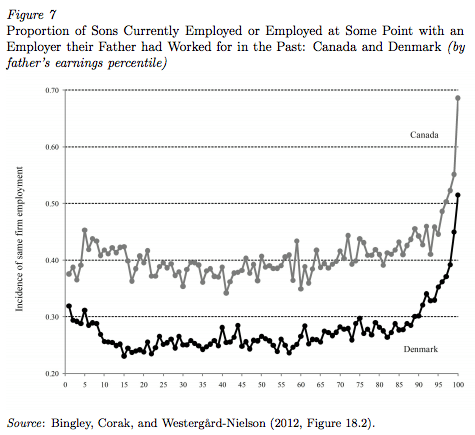A cliche image of wealth and privilege is a college graduate taking up a management position at his father’s firm to be groomed to take his father’s place as president.
Earlier this week, we published data that shows how the members of the Forbes 400 List – America’s .0001% – is becoming more meritocratic. The means of a middle class background and access to a college education remain an important prerequisite, but the percentage of America’s wealthiest individuals who inherited their wealth has decreased over time.
Across the upper class, however, the narrative seems to be the reverse as intergenerational mobility has decreased. In other words, Americans are less likely to rise (or fall) from the class and income strata in which they are born.
“Income Inequality, Equality of Opportunity, and Intergenerational Mobility,” a recently published paper by Dr. Miles Corak of the University of Ottawa, exhaustively investigates reduced socioeconomic mobility in America and the West with increased income inequality as its starting point.
One visual from the paper that stands out is the following graph, which shows the percentage of men who work or have worked for a current or former employer of their father:

Source: Journal of Economic Perspectives
As the graph shows, sons often work at companies that once employed their father. But at the upper income percentiles, the probability shoots up. You could say that as you approach the limit of the countries’ richest men, the probability that their sons will work with one of their former or current employers heads toward 100%.
We don’t have similar data for the United States, and the graph cannot prove messy questions of causality. But it strikingly visualizes a common sense notion – that the institutions capable of furnishing the largest incomes constitute a small world where the connections of growing up under the care of a politics or business magnate proves extremely valuable. Corak argues that this “intergenerational transmission of employers” is an important factor behind birth increasingly dictating economic outcomes.
Wealthy Americans and Europeans aren’t all inheriting business empires from their parents. But following a parent toward a prosperous career like a north star is common.
To get occasional notifications when we write blog posts, sign up for our email list. If you’d like to read more about this topic, check out our blog post “Do Parasites Produce Dictators?.”




